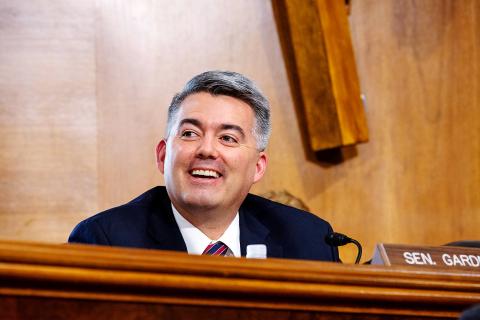Four US senators on Thursday reintroduced a draft bill to ensure that Taiwan is recognized internationally, as China increases efforts to limit Taipei’s participation on the global scene and poach its diplomatic allies.
US senators Cory Gardner, Marco Rubio, John Cornyn and Chris Coons renewed efforts to pass the Taiwan Allies International Protection and Enhancement Initiative Act, or the TAIPEI Act, which would require the US government to engage with governments worldwide in a bid to support Taiwan’s diplomatic recognition and strengthen unofficial ties with Taiwan.
The bill, first introduced in September last year, says that 90 days after its enactment and every 180 days thereafter the “secretary of state or a designee of the secretary shall submit to the appropriate congressional committees a report on actions taken by the US to reaffirm and strengthen Taiwan’s international alliances around the world.”

Photo: Bloomberg
The number of Taiwan’s diplomatic allies has fallen to 17 since President Tsai Ing-wen (蔡英文) took office and China lured the Gambia, Sao Tome and Principe, Panama, the Dominican Republic, Burkina Faso and El Salvador away, the bill says, adding that it would authorize the US Department of State to downgrade ties with any government that take actions unfavorable to Taiwan, as well as suspending or adjusting foreign assistance to such governments.
According to the draft, the US government should help Taiwan gain participation in international organizations, either as a member or an observer, and express its support for Taiwan’s participation on the global stage when interacting with Beijing.
The TAIPEI Act continues Washington’s commitment to Taiwan’s security by conducting “regular transfers of defense articles to Taiwan that are tailored to meet the existing and likely future threat” from China.
It also mentions the Taiwan Travel Act, which was signed into law by US President Donald Trump on March 16 last year to encourage mutual visits between Taiwanese and US officials.
“The US should use every tool to support Taiwan’s standing on the international stage,” Gardner said in a statement issued by the senators who sponsored the bill.
“This bipartisan legislation demands a whole-of-government approach to stand up to China’s bullying tactics and will send a strong message to nations that there will be consequences for supporting Chinese actions that undermine Taiwan,” he said.
Rubio said in the statement that he was proud to join his colleagues in reintroducing the legislation that reaffirmed the US’ commitment to its relationship with Taiwan and would allow the department to take diplomatic action against governments that alter diplomatic relations with Taiwan in favor of China.
“China’s efforts to isolate Taiwan by bullying and pressuring countries, especially in our own hemisphere, cannot go unanswered,” Rubio said.
There was strong, bipartisan support for Taiwan’s free-market democracy and its diplomatic relationships around the world, Coons said, adding that the bill confirmed that.
“Taiwan is a success story in its region, and both now and in the future, the US must continue to emphasize the strength of US-Taiwan ties and maintain the status quo regarding Taiwan’s place in the international community,” Coons said.

Taiwanese were praised for their composure after a video filmed by Taiwanese tourists capturing the moment a magnitude 7.5 earthquake struck Japan’s Aomori Prefecture went viral on social media. The video shows a hotel room shaking violently amid Monday’s quake, with objects falling to the ground. Two Taiwanese began filming with their mobile phones, while two others held the sides of a TV to prevent it from falling. When the shaking stopped, the pair calmly took down the TV and laid it flat on a tatami mat, the video shows. The video also captured the group talking about the safety of their companions bathing

US climber Alex Honnold is to attempt to scale Taipei 101 without a rope and harness in a live Netflix special on Jan. 24, the streaming platform announced on Wednesday. Accounting for the time difference, the two-hour broadcast of Honnold’s climb, called Skyscraper Live, is to air on Jan. 23 in the US, Netflix said in a statement. Honnold, 40, was the first person ever to free solo climb the 900m El Capitan rock formation in Yosemite National Park — a feat that was recorded and later made into the 2018 documentary film Free Solo. Netflix previewed Skyscraper Live in October, after videos

Starting on Jan. 1, YouBike riders must have insurance to use the service, and a six-month trial of NT$5 coupons under certain conditions would be implemented to balance bike shortages, a joint statement from transportation departments across Taipei, New Taipei City and Taoyuan announced yesterday. The rental bike system operator said that coupons would be offered to riders to rent bikes from full stations, for riders who take out an electric-assisted bike from a full station, and for riders who return a bike to an empty station. All riders with YouBike accounts are automatically eligible for the program, and each membership account

A classified Pentagon-produced, multiyear assessment — the Overmatch brief — highlighted unreported Chinese capabilities to destroy US military assets and identified US supply chain choke points, painting a disturbing picture of waning US military might, a New York Times editorial published on Monday said. US Secretary of Defense Pete Hegseth’s comments in November last year that “we lose every time” in Pentagon-conducted war games pitting the US against China further highlighted the uncertainty about the US’ capability to intervene in the event of a Chinese invasion of Taiwan. “It shows the Pentagon’s overreliance on expensive, vulnerable weapons as adversaries field cheap, technologically